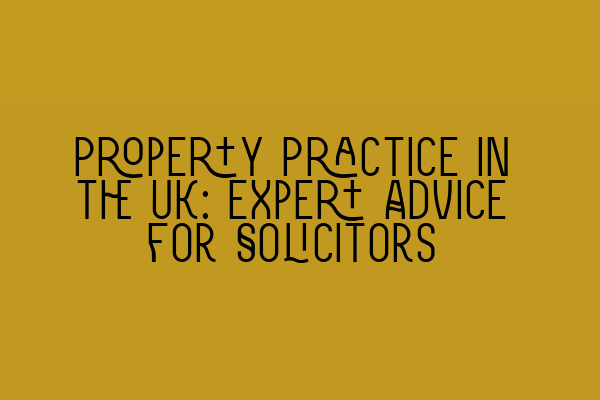Property Practice in the UK: Expert Advice for Solicitors
Welcome to SQE Property Law & Land Law, where our team of expert solicitors specialize in property law practice in the UK. In this blog post, we will provide valuable advice and insights for solicitors who are keen on expanding their knowledge and expertise in this field. Whether you are a seasoned professional or just starting out, we aim to help you stay on top of the latest trends and best practices.
Now, let’s dive into the world of property practice in the UK and discuss key areas that every solicitor should be well-versed in.
1. Mastering Residential Conveyancing:
Residential conveyancing is an integral part of property practice. As a solicitor, it is crucial to have a solid understanding of the buying and selling process, property searches, title documentation, and completion procedures. Stay updated with the latest legislation and case law to ensure you provide accurate advice to your clients.
2. Commercial Property Transactions:
Commercial property transactions bring unique challenges and complexities. Whether it’s lease agreements, property development, or financing, solicitors need to be well-versed in areas such as planning permission, environmental regulations, and tenant rights. Providing robust and practical advice to clients will set you apart in this competitive landscape.
3. Landlord and Tenant Disputes:
Handling landlord and tenant disputes is a common aspect of property practice. Familiarize yourself with the intricacies of tenancy agreements, eviction processes, deposit schemes, and arrears management. Keep in mind the ever-changing landscape of rental regulations and stay updated to best represent your clients’ interests.
4. Real Estate Finance and Property Investment:
The property market is closely tied to finance and investment. Solicitors representing clients in property investment and finance need to have a comprehensive understanding of mortgage law, loan agreements, property portfolio management, and tax implications. Ensuring your clients’ investments are legally secure and financially viable is paramount.
5. Ethical Considerations:
As an esteemed solicitor, maintaining the highest ethical standards is pivotal. Uphold confidentiality, avoid conflicts of interest, and provide impartial advice with utmost integrity. Demonstrating your ethical practice will not only foster client trust but also enhance your professional reputation.
6. Embracing Technology:
In the digital age, embracing technology is imperative for property solicitors. Stay updated with the latest legal software, digital conveyancing platforms, and online search tools. Efficiently managing documents, deadlines, and client communication will streamline your work, enabling you to deliver exceptional service.
7. Collaboration and Networking:
Building a solid network of professionals in the property industry is essential for solicitors. Attend conferences and seminars to stay connected with industry peers, potential clients, and experts. Collaborate with other solicitors, surveyors, and agents to offer integrated services and expand your client base.
At SQE Property Law & Land Law, we understand the nuances of property practice in the UK. Our team of experienced solicitors can guide you through the complexities of residential and commercial property transactions, landlord and tenant disputes, real estate finance, and more.
By continuously developing your skills, embracing technology, and adhering to ethical standards, you can differentiate yourself as a sought-after property solicitor. Remember, staying updated and informed is the key to success in this competitive field.
If you are looking for expert advice or need assistance with property matters, contact SQE Property Law & Land Law today. Our team is committed to providing exceptional service and delivering positive outcomes for our clients.
Disclaimer: This blog post is for informational purposes only and should not be considered as legal advice. Consult a qualified solicitor for personalized advice tailored to your specific situation.
